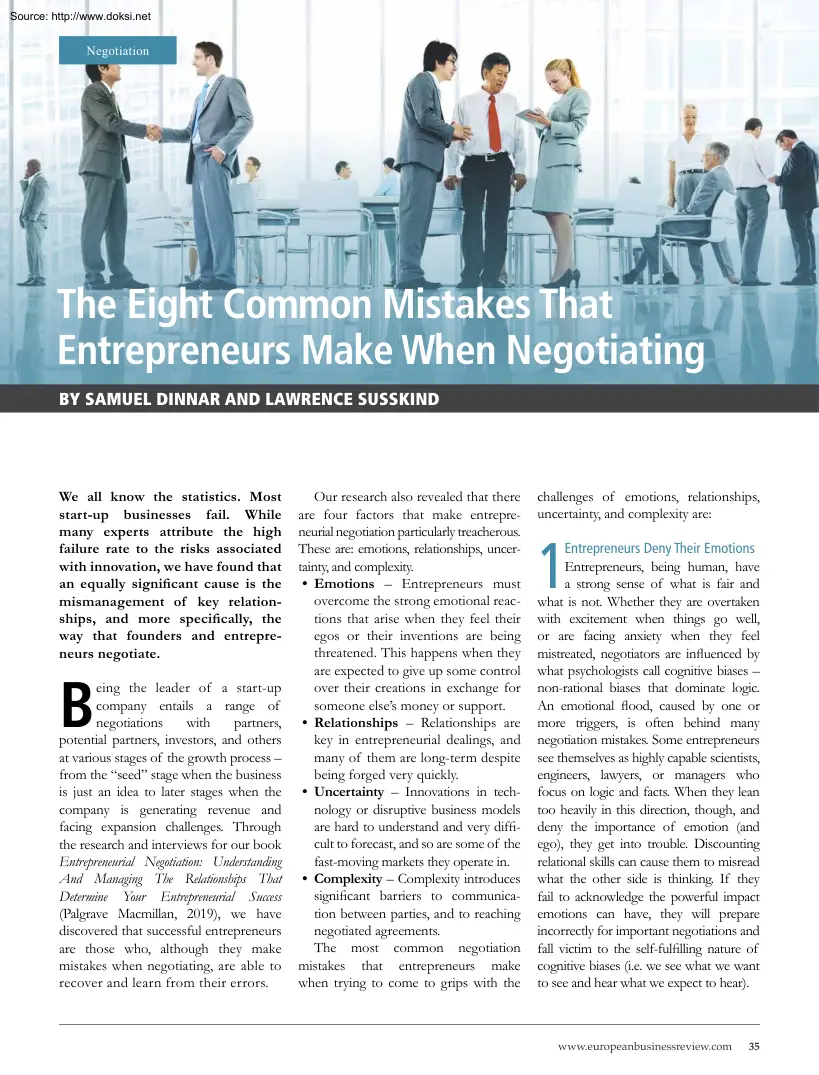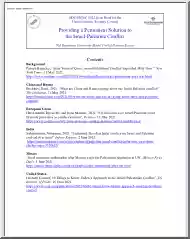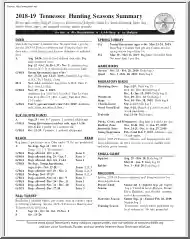Comments
No comments yet. You can be the first!
Content extract
Source: http://www.doksinet Negotiation The Eight Common Mistakes That Entrepreneurs Make When Negotiating BY SAMUEL DINNAR AND LAWRENCE SUSSKIND We all know the statistics. Most start-up businesses fail. While many experts attribute the high failure rate to the risks associated with innovation, we have found that an equally significant cause is the mismanagement of key relationships, and more specifically, the way that founders and entrepreneurs negotiate. B eing the leader of a start-up company entails a range of negotiations with partners, potential partners, investors, and others at various stages of the growth process – from the “seed” stage when the business is just an idea to later stages when the company is generating revenue and facing expansion challenges. Through the research and interviews for our book Entrepreneurial Negotiation: Understanding And Managing The Relationships That Determine Your Entrepreneurial Success (Palgrave Macmillan, 2019), we have
discovered that successful entrepreneurs are those who, although they make mistakes when negotiating, are able to recover and learn from their errors. Our research also revealed that there are four factors that make entrepreneurial negotiation particularly treacherous. These are: emotions, relationships, uncertainty, and complexity. • Emotions – Entrepreneurs must overcome the strong emotional reactions that arise when they feel their egos or their inventions are being threatened. This happens when they are expected to give up some control over their creations in exchange for someone else’s money or support. • Relationships – Relationships are key in entrepreneurial dealings, and many of them are long-term despite being forged very quickly. • Uncertainty – Innovations in technology or disruptive business models are hard to understand and very difficult to forecast, and so are some of the fast-moving markets they operate in. • Complexity – Complexity introduces
significant barriers to communication between parties, and to reaching negotiated agreements. The most common negotiation mistakes that entrepreneurs make when trying to come to grips with the challenges of emotions, relationships, uncertainty, and complexity are: 1 Entrepreneurs Deny Their Emotions Entrepreneurs, being human, have a strong sense of what is fair and what is not. Whether they are overtaken with excitement when things go well, or are facing anxiety when they feel mistreated, negotiators are influenced by what psychologists call cognitive biases – non-rational biases that dominate logic. An emotional flood, caused by one or more triggers, is often behind many negotiation mistakes. Some entrepreneurs see themselves as highly capable scientists, engineers, lawyers, or managers who focus on logic and facts. When they lean too heavily in this direction, though, and deny the importance of emotion (and ego), they get into trouble. Discounting relational skills can cause
them to misread what the other side is thinking. If they fail to acknowledge the powerful impact emotions can have, they will prepare incorrectly for important negotiations and fall victim to the self-fulfilling nature of cognitive biases (i.e we see what we want to see and hear what we expect to hear). www.europeanbusinessreviewcom 35 Source: http://www.doksinet Negotiation 2 Entrepreneurs Rely Too Heavily on Their Intuition Entrepreneurial negotiation involves many moving parts and multiple factors must be considered simultaneously, which can create surprises. When entrepreneurs are required to respond suddenly to these surprises, many rely on their intuition – and the instincts that made them successful. But often they don’t know why or how their intuition worked in the past. Because of this, they are shooting in the dark. Thus, they find new kinds of interactions (or old kinds of negotiations with new people) extremely frustrating: what worked before isn’t working this
time. When negotiations don’t go as expected, many entrepreneurs blame the difficulty on the other side. To make matters worse, these same problems can keep occurring because they don’t learn from their mistakes. This is because they have not taken the time to develop a clear-cut personal theory of practice based on what works, instead of relying on intuition alone. convictions about non-negotiable items that cause them to fall prey to “tunnelvision.” Demands from the other side that are perceived as unreasonable may trigger strong emotional reactions, and cause escalation in rhetoric, positional posturing, and self-defeating lock-in. These are all traps that can be avoided. 3 Entrepreneurs Are Too Quick to Compromise Entrepreneurs must “get thing done” under serious time pressures and multi-tasking challenges. They often feel pressured to make quick decisions so they can get back to the more interesting parts of building a great product or service. But quick compromises
may be bad for everyone, and leave significant joint gains unexplored. When the stakes are very high, the pressure to compromise builds. There may be fear of undermining an important relationship or risk losing the entire unique deal opportunity. Entrepreneurs Haggle Unfortunately, bad examples of negotiation abound in pop culture and news media. First and foremost is the notion of haggling – focusing on a single issue such as price under the assumption that more for one side always means less for the other. Such “zero-sum” bargaining often leaves both sides worse off than if they had explored other issues that could lead to mutually advantageous outcomes. Entrepreneurs believe strongly in the uniqueness and value of their company, product or idea. They develop 4 Entrepreneurs Work Alone A lean start-up can accomplish what many larger competitors cannot, and some founders are true visionaries who can single-handedly transform an entire industry. But when leaders assume that
they are the only ones with sufficient insight to understand what is really at stake, and they prepare alone and try to negotiate solo, they are often their own worst enemy. Acting alone can cause them to misread signals (cognitive biases again), react unreasonably, or vent at the wrong time. A trusted advisor or partner can provide balance. Negotiation should be seen as an organisational task. 5 Entrepreneurial negotiators who are afraid to invest in the exploration of possible value creating options don’t do themselves any favours. 6 Entrepreneurs Need to Win – Now. Many business leaders are highly competitive individuals. Their objective is to win every encounter. Overly competitive entrepreneurs, however, may be inappropriately concerned about doing better than (i.e beating) their counterpart than about maximising their own results. They may be too focused on the outcome of one interaction, instead of considering the impact on longterm relationships that depends on the
other side feeling good about today’s deal (such that they will want to come back for more in the future). 7 Entrepreneurs Are Overly Optimistic and Overconfident Innovative endeavours are often wrapped up in significant technical, engineering, and scientific uncertainty. Trying to modify markets and reshape customer behaviour in a changing regulatory landscape and an unpredictable economic environment causes increasing risk. But many entrepreneurs are supremely confident in their predictions, and believe their past successes are predictors of their ability to beat-the-odds. Thus, they may fail to formulate contingent plans, assuming that negotiations will go well. Or, they may put too much trust in their ability to deal with whatever problems arise. In the agreements they reach, they may fail to include contingent clauses or dispute resolution provisions. Successful entrepreneurs manage all these negotiations in a manner that is consistent with their own values, priorities, and
preferences, but they also have a self-awareness that enables them to make adjustments and switch directions. 36 The European Business Review May - June 2019 Source: http://www.doksinet Effective entrepreneurial negotiators develop a life-long commitment to reflection on their past negotiations and commit to acquiring the skills needed to adjust in a fast-changing world. 8 Entrepreneurs are Self-Centred Entrepreneurs are very focused on their own actions and interests. To an extent, this is beneficial in a start-up situation. But, it may come at the expense of considering the needs and priorities of others. If they stay in a self-centred mind-set, entrepreneurs can misinterpret their counterpart’s underlying interests. They may also ignore the interests of their partners or parties who are not at the table. Such a mind-set may cause them to overreact or attribute bad intentions to others whose positions are in conflict with their own ego-centred desires. Entrepreneur who is
assertive can serve their own interests, but if they do not listen empathetically to the concerns of the other side, they may cause negotiating partners to reciprocate, incurring unnecessary costs for both. In our interviews, we began to see these eight mistakes occur over and over again as entrepreneurs engage with a range of internal and external players: external backers (such as investors), internals (such as the co-founders and the employees who form the backbone of the company), frontliners (individuals, agents or partners that represent the company to the outside world) and outsiders (people who have little or no current knowledge of the company, but who may become future customers, employees, investors or partners). Successful entrepreneurs manage all these negotiations in a manner that is consistent with their own values, priorities, and preferences, but they also have a self-awareness that enables them to make adjustments and switch directions. They know when to seek help
from colleagues and advisors. They carefully prepare for each negotiation, and pay close attention during face-to-face interactions, finding ways to both create and distribute value that both sides can judge to be fair. They are disciplined about following through on their commitments and tending to relationships. They also reflect carefully on what is happening in order to further refine their personal theory of practice. If entrepreneurs treat negotiation as one of their most important responsibilities, they can prevent serious mistakes, detect errors as soon as they make them, and respond effectively when they do occur. Effective entrepreneurial negotiators develop a life-long commitment to reflection on their past negotiations and commit to acquiring the skills needed to adjust in a fast-changing world. About the Authors Samuel Dinnar, co-author of Entrepreneurial Negotiation, is an instructor at the Program on Negotiation at Harvard Law School and the Massachusetts Institute of
Technology in Cambridge, Massachusetts. As founder and President of Meedance, he provides global consulting services and serves as a mediator specialising in business conflicts that involve founders, executives, investors, and board members. To learn more, visit: www.EntrepreneurialNegotiationcom or www.meedancecom Lawrence Susskind, co-author of Entrepreneurial Negotiation, is a professor of urban and environmental planning at the Massachusetts Institute of Technology, co-founder of the Program on Negotiation at Harvard Law School, and the founder of the Consensus Building Institute in Cambridge, Massachusetts. To learn more, visit www.EntrepreneurialNegotiationcom www.europeanbusinessreviewcom 37
discovered that successful entrepreneurs are those who, although they make mistakes when negotiating, are able to recover and learn from their errors. Our research also revealed that there are four factors that make entrepreneurial negotiation particularly treacherous. These are: emotions, relationships, uncertainty, and complexity. • Emotions – Entrepreneurs must overcome the strong emotional reactions that arise when they feel their egos or their inventions are being threatened. This happens when they are expected to give up some control over their creations in exchange for someone else’s money or support. • Relationships – Relationships are key in entrepreneurial dealings, and many of them are long-term despite being forged very quickly. • Uncertainty – Innovations in technology or disruptive business models are hard to understand and very difficult to forecast, and so are some of the fast-moving markets they operate in. • Complexity – Complexity introduces
significant barriers to communication between parties, and to reaching negotiated agreements. The most common negotiation mistakes that entrepreneurs make when trying to come to grips with the challenges of emotions, relationships, uncertainty, and complexity are: 1 Entrepreneurs Deny Their Emotions Entrepreneurs, being human, have a strong sense of what is fair and what is not. Whether they are overtaken with excitement when things go well, or are facing anxiety when they feel mistreated, negotiators are influenced by what psychologists call cognitive biases – non-rational biases that dominate logic. An emotional flood, caused by one or more triggers, is often behind many negotiation mistakes. Some entrepreneurs see themselves as highly capable scientists, engineers, lawyers, or managers who focus on logic and facts. When they lean too heavily in this direction, though, and deny the importance of emotion (and ego), they get into trouble. Discounting relational skills can cause
them to misread what the other side is thinking. If they fail to acknowledge the powerful impact emotions can have, they will prepare incorrectly for important negotiations and fall victim to the self-fulfilling nature of cognitive biases (i.e we see what we want to see and hear what we expect to hear). www.europeanbusinessreviewcom 35 Source: http://www.doksinet Negotiation 2 Entrepreneurs Rely Too Heavily on Their Intuition Entrepreneurial negotiation involves many moving parts and multiple factors must be considered simultaneously, which can create surprises. When entrepreneurs are required to respond suddenly to these surprises, many rely on their intuition – and the instincts that made them successful. But often they don’t know why or how their intuition worked in the past. Because of this, they are shooting in the dark. Thus, they find new kinds of interactions (or old kinds of negotiations with new people) extremely frustrating: what worked before isn’t working this
time. When negotiations don’t go as expected, many entrepreneurs blame the difficulty on the other side. To make matters worse, these same problems can keep occurring because they don’t learn from their mistakes. This is because they have not taken the time to develop a clear-cut personal theory of practice based on what works, instead of relying on intuition alone. convictions about non-negotiable items that cause them to fall prey to “tunnelvision.” Demands from the other side that are perceived as unreasonable may trigger strong emotional reactions, and cause escalation in rhetoric, positional posturing, and self-defeating lock-in. These are all traps that can be avoided. 3 Entrepreneurs Are Too Quick to Compromise Entrepreneurs must “get thing done” under serious time pressures and multi-tasking challenges. They often feel pressured to make quick decisions so they can get back to the more interesting parts of building a great product or service. But quick compromises
may be bad for everyone, and leave significant joint gains unexplored. When the stakes are very high, the pressure to compromise builds. There may be fear of undermining an important relationship or risk losing the entire unique deal opportunity. Entrepreneurs Haggle Unfortunately, bad examples of negotiation abound in pop culture and news media. First and foremost is the notion of haggling – focusing on a single issue such as price under the assumption that more for one side always means less for the other. Such “zero-sum” bargaining often leaves both sides worse off than if they had explored other issues that could lead to mutually advantageous outcomes. Entrepreneurs believe strongly in the uniqueness and value of their company, product or idea. They develop 4 Entrepreneurs Work Alone A lean start-up can accomplish what many larger competitors cannot, and some founders are true visionaries who can single-handedly transform an entire industry. But when leaders assume that
they are the only ones with sufficient insight to understand what is really at stake, and they prepare alone and try to negotiate solo, they are often their own worst enemy. Acting alone can cause them to misread signals (cognitive biases again), react unreasonably, or vent at the wrong time. A trusted advisor or partner can provide balance. Negotiation should be seen as an organisational task. 5 Entrepreneurial negotiators who are afraid to invest in the exploration of possible value creating options don’t do themselves any favours. 6 Entrepreneurs Need to Win – Now. Many business leaders are highly competitive individuals. Their objective is to win every encounter. Overly competitive entrepreneurs, however, may be inappropriately concerned about doing better than (i.e beating) their counterpart than about maximising their own results. They may be too focused on the outcome of one interaction, instead of considering the impact on longterm relationships that depends on the
other side feeling good about today’s deal (such that they will want to come back for more in the future). 7 Entrepreneurs Are Overly Optimistic and Overconfident Innovative endeavours are often wrapped up in significant technical, engineering, and scientific uncertainty. Trying to modify markets and reshape customer behaviour in a changing regulatory landscape and an unpredictable economic environment causes increasing risk. But many entrepreneurs are supremely confident in their predictions, and believe their past successes are predictors of their ability to beat-the-odds. Thus, they may fail to formulate contingent plans, assuming that negotiations will go well. Or, they may put too much trust in their ability to deal with whatever problems arise. In the agreements they reach, they may fail to include contingent clauses or dispute resolution provisions. Successful entrepreneurs manage all these negotiations in a manner that is consistent with their own values, priorities, and
preferences, but they also have a self-awareness that enables them to make adjustments and switch directions. 36 The European Business Review May - June 2019 Source: http://www.doksinet Effective entrepreneurial negotiators develop a life-long commitment to reflection on their past negotiations and commit to acquiring the skills needed to adjust in a fast-changing world. 8 Entrepreneurs are Self-Centred Entrepreneurs are very focused on their own actions and interests. To an extent, this is beneficial in a start-up situation. But, it may come at the expense of considering the needs and priorities of others. If they stay in a self-centred mind-set, entrepreneurs can misinterpret their counterpart’s underlying interests. They may also ignore the interests of their partners or parties who are not at the table. Such a mind-set may cause them to overreact or attribute bad intentions to others whose positions are in conflict with their own ego-centred desires. Entrepreneur who is
assertive can serve their own interests, but if they do not listen empathetically to the concerns of the other side, they may cause negotiating partners to reciprocate, incurring unnecessary costs for both. In our interviews, we began to see these eight mistakes occur over and over again as entrepreneurs engage with a range of internal and external players: external backers (such as investors), internals (such as the co-founders and the employees who form the backbone of the company), frontliners (individuals, agents or partners that represent the company to the outside world) and outsiders (people who have little or no current knowledge of the company, but who may become future customers, employees, investors or partners). Successful entrepreneurs manage all these negotiations in a manner that is consistent with their own values, priorities, and preferences, but they also have a self-awareness that enables them to make adjustments and switch directions. They know when to seek help
from colleagues and advisors. They carefully prepare for each negotiation, and pay close attention during face-to-face interactions, finding ways to both create and distribute value that both sides can judge to be fair. They are disciplined about following through on their commitments and tending to relationships. They also reflect carefully on what is happening in order to further refine their personal theory of practice. If entrepreneurs treat negotiation as one of their most important responsibilities, they can prevent serious mistakes, detect errors as soon as they make them, and respond effectively when they do occur. Effective entrepreneurial negotiators develop a life-long commitment to reflection on their past negotiations and commit to acquiring the skills needed to adjust in a fast-changing world. About the Authors Samuel Dinnar, co-author of Entrepreneurial Negotiation, is an instructor at the Program on Negotiation at Harvard Law School and the Massachusetts Institute of
Technology in Cambridge, Massachusetts. As founder and President of Meedance, he provides global consulting services and serves as a mediator specialising in business conflicts that involve founders, executives, investors, and board members. To learn more, visit: www.EntrepreneurialNegotiationcom or www.meedancecom Lawrence Susskind, co-author of Entrepreneurial Negotiation, is a professor of urban and environmental planning at the Massachusetts Institute of Technology, co-founder of the Program on Negotiation at Harvard Law School, and the founder of the Consensus Building Institute in Cambridge, Massachusetts. To learn more, visit www.EntrepreneurialNegotiationcom www.europeanbusinessreviewcom 37





